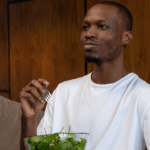When Oscar walked into the emergency room in August 2020, he thought it would be a quick visit. But within hours, doctors delivered news that would change his life forever — he had type 2 diabetes.
At 268 pounds and feeling constantly fatigued, he didn’t realize his body had been signaling distress for months. He was admitted immediately and spent five long days in the hospital, coming face-to-face with a diagnosis that disproportionately affects Black men across the country.
“I remember lying in that bed thinking, Is this how my story ends? I had to make a decision to live”, he said.
That moment of truth became his turning point. Oscar decided that survival wasn’t enough. He wanted to thrive. He began a complete overhaul of his nutrition, fitness, and mindset. What started as short walks around his neighborhood turned into daily workouts. He swapped fast food for home-cooked meals, learned to read nutrition labels, and leaned into consistency over perfection. Within a year, he had lost 80 pounds. His blood sugar stabilized. He reduced his reliance on medication. And most importantly, he reclaimed his life.
A Crisis in Our Community
Oscar’s story isn’t unique but it is urgent. According to the Centers for Disease Control and Prevention (CDC), more than 38 million Americans are living with diabetes, and about 1 in 5 don’t know it.1 Among Black adults, the rates are even higher.2 Our communities are more likely to be diagnosed with diabetes, and nearly twice as likely to experience complications like kidney failure, vision loss, and amputations.2
The reasons are deeply rooted in systemic inequities. Many predominantly Black communities are food deserts, where fast food chains outnumber grocery stores, and healthy options are expensive or out of reach.3 Limited access to preventive care, high stress from systemic racism, and a lack of culturally competent providers further widen the gap.3
For Black men, the challenge runs even deeper, studies show they are less likely to seek medical care due to stigma, mistrust of the healthcare system, and cultural pressures to “tough it out”.4
When diabetes goes untreated, the effects can be devastating. It increases the risk of heart disease, stroke, and nerve damage, and can silently harm the kidneys and eyes before symptoms even appear.2 But as Oscar’s journey proves, the diagnosis doesn’t have to define the story.
Rewriting the Narrative
Oscar decided to take his health into his own hands, and that decision changed everything. “I didn’t want to be dependent on medication for the rest of my life,” he shared. “I wanted to build habits that would allow me to live freely and set an example for my kids.”
Today, Oscar is living proof that lifestyle changes can be transformative. His story embodies the resilience, discipline, and self-determination that define so many in our community. But more than that, it’s a reminder that Black men’s health is not just about individual choices, it’s about collective change.
When one man commits to his health, the ripple effects extend to his family, his friends, and his neighborhood. Children watch, partners follow, and communities begin to heal.
A Call to Black Men
To the brothers reading this: your health matters. Your strength isn’t measured by how much you can carry, but by how long you can live to carry it. You deserve care, rest, and a body that serves you well. Schedule your checkups. Ask questions. Make movement a daily act of love for yourself.
And this Thankful November, we pause to honor Oscar — for his courage to share his story, his discipline to change his life, and his commitment to inspiring others to take intentional action toward better health. Because every story like his lights the way for another brother to take the first step.
As Oscar reminds us, “We need to take our health seriously so we can pass down a legacy of health to our children and their children.”
That legacy starts with you, today, in this moment.
Join the Movement
Do you have a health story you’d like to share — or need motivation to make new healthy choices?
Join the NOWINCLUDED community today by downloading the app and connecting with others who are rewriting their health stories one choice at a time.
Because when we share our stories, we don’t just change lives, we save them.
References
- CDC. (2024, May 15). A Report Card: Diabetes in the United States Infographic. Retrieved from Centers for Disease Control and Prevention: https://www.cdc.gov/diabetes/communication-resources/diabetes-statistics.html
- Haw, J. S., Shah, M., Turbow, S., Egeolu, M., & Umpierrez, G. (2021). Diabetes Complications in Racial and Ethnic Minority Populations in the USA. Current Diabetes Reports. doi:10.1007/s11892-020-01369-x
- Stowers, K. C., Jiang, Q., Atoloye, A. T., Lucan, S., & Gans, K. (2020). Racial Differences in Perceived Food Swamp and Food Desert Exposure and Disparities in Self-Reported Dietary Habits. International Journal of Environmental Research and Public Health. doi:10.3390/ijerph17197143
- Powell, W., Richmond, J., Mohottige, D., Yen, I., Joslyn, A., & Corbie-Smith, G. (2021). Medical mistrust, racism, and delays in preventive health screening among African-American men. Journal of Behavioral Medicine. doi:10.1080/08964289.2019.1585327







